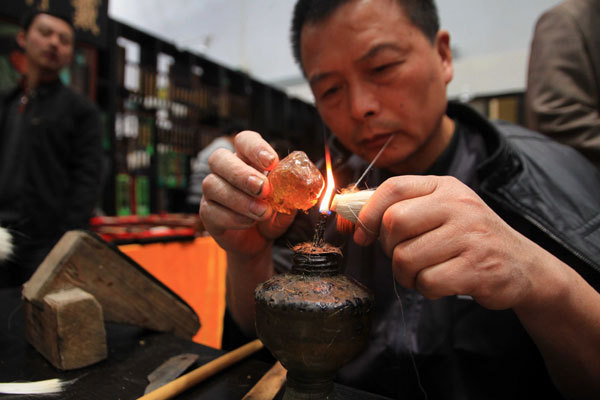Economy
China's IPR protection is appreciated
By Chen Xin (China Daily)
Updated: 2010-11-19 07:05
 |
Large Medium Small |
|
 A craftman attending the Third China International Copyright Expo in Beijing demonstrates on Thursday how to make a brush pen. [Wang Jing/China Daily] |
BEIJING - China is helping lead the charge in the fight to protect intellectual property rights, receiving the world's fifth largest number of international patent applications, Francis Gurry, director-general of the World Intellectual Property Organization (WIPO), said on Thursday.
| ||||
Intellectual property protection in China has undergone remarkable development since the country joined the WIPO 30 years ago, he said.
A rapid expansion of intellectual property rights is currently under way in China, which globally ranks No 1 in terms of the number of trademark offices and third for patent offices.
In a knowledge-based world, the demand for inventions and intellectual property continues to increase, Gurry said, noting that 1.9 million patents, 3.3 million trademarks and 700,000 industrial design applications are filed around the world each year.
|
 Francis Gurry is director-general of the World Intellectual Property Organization.
|
Since duplicate applications are filed in different countries, he said an international administrative system is required to cooperatively process them and keep pace with demand.
China also needs to take an active role in fighting copyright piracy, a structural problem that compromises world economies, he said.
"How can you finance your culture in this digital and Internet era?" he asked. "We all want music, movies and literature, but they are not free. So copyright has provided a mechanism for financing culture."
The crux of the current challenge is to find a way to tap the technological possibilities of the Internet, which is extraordinary at distributing cultural goods, while protecting and rewarding the efforts of writers, performers and actors.
"To solve these problems, we need the leadership of China," he said.
Although there has been a notable increase in domestic and international patent applications in China, officials and experts cautioned that a large number of them have yet to be used productively.
In assessing the situation, Tian Lipu, commissioner of the State Intellectual Property Office, said earlier this year that the country's innovative ability was out of sync with its economic development and that China lacked its own intellectual property in some key industries and fields.
China's economic hub, Shanghai, filed 62,241 patent applications in 2009, but only about 10 percent of them have been put into production, according to an earlier report by China Youth Daily.
"Many of China's policies concentrate on the protection of intellectual property rights, but we lack policies that can help utilize the patents to develop industries," said Feng Xiaoqing, who specializes in intellectual property at China University of Political Science and Law.
According to Feng, the channels for translating patents into productivity need to be made smoother.
The proposal of the 12th Five-Year Plan (2011-2015), a national economic and social development plan for the next five years, highlighted the importance of translating intellectual fruit into productivity, he said.
"It shows that we have started to wake up to the importance of such issues."
Cao Yin contributed to this story.
China Daily



